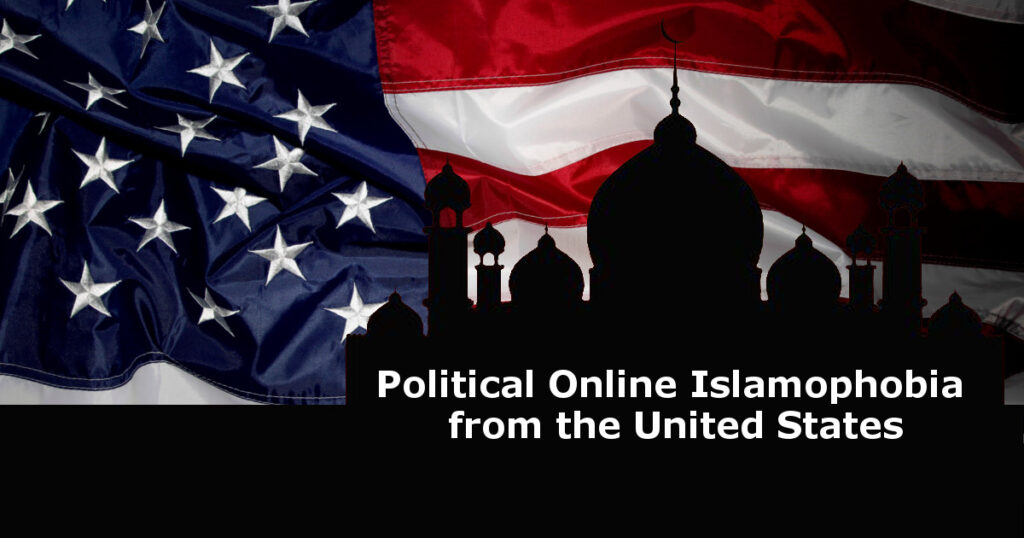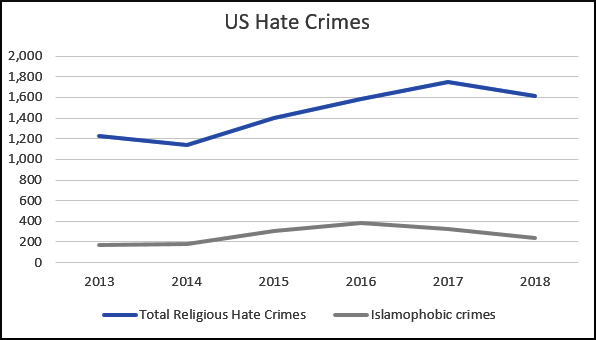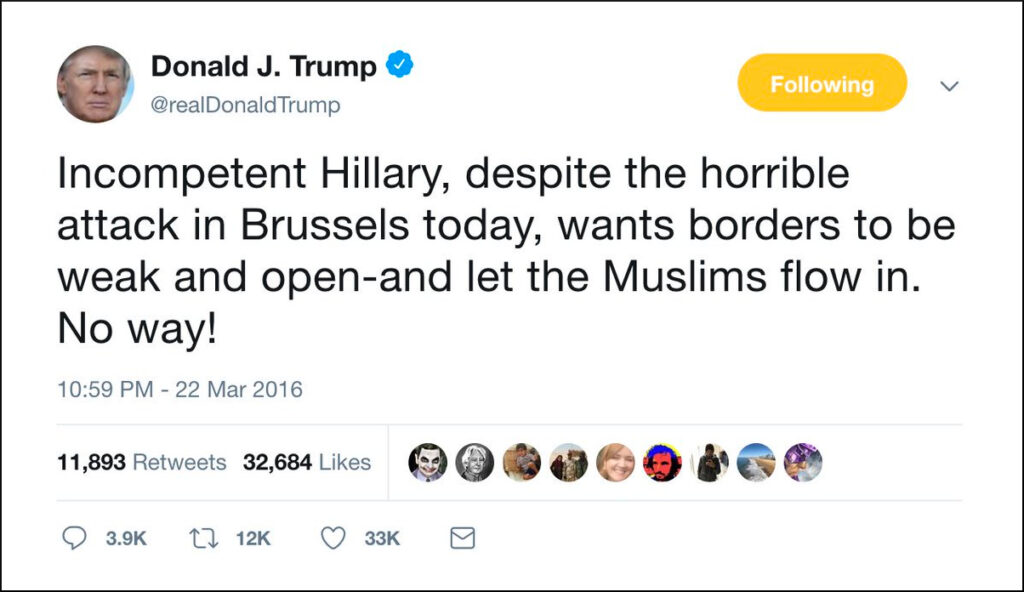Osiris Parikh – 30th March 2020

OVERVIEW
The United States has faced an influx of recent content spurring Islamophobic and hateful undertones. Inflamed by anti-Muslim sentiments stemming from the terrorist attacks of 9/11, and catalyzed by xenophobic rhetoric from U.S. President Donald Trump, Islamophobic content on social media has followed the trend of rising hate crimes and violence against religious groups in the country. Because most hate speech is not illegal in the United States, the options for government action to prevent the spread of hate is limited. Individual platforms, however, have the ability to ban hate speech under their community standards or terms of service and can take action breaches including removing content or closing account.
This briefing looks at examples of American specific Islamophobia online. While directed at a US audience, this content and the response to it by platforms sets a general tone which also impacts other countries.
Hate Crime
The FBI Hate Crime Statistics Program collects “data regarding criminal offenses that were motivated, in whole or in part, by the offender’s bias against the victim’s race/ethnicity/ancestry, gender, gender identity, religion, disability, or sexual orientation, and were committed against persons, property, or society”.[1]
The number of hate crimes against groups on the basis of their religion can be tracked based on data from the FBI report.[2] The number of religious hate crimes has grown significantly over the last few years. Islamophobic hate crimes rose sharply in 2016, likely a result of rhetoric around the US Presidential election.[3] With the 2020 Presidential Election on the horizon, these sentiments are again emerging online.

Trump Tweets
President Trump has often used anti-Muslim rhetoric during his campaign for the Presidency and during his time in the White House. Perhaps one of his most egregious and infamous examples occurred in a 2015 campaign rally: that he called for a “…total and complete shutdown of Muslims entering the United States…”[4]
He has also had a long history of pedaling conspiracy theories, oftentimes retweeting Islamophobic content. In 2017, Trump retweeted three Islamophobic videos first posted by Jayda Fransen, the former deputy leader of Britain’s far-right party, Britain First. The videos, according to CNN, “depict[ed] violent assaults and the destruction of a statue of the Virgin Mary.”[5]

Following the 2016 bombings in Brussels, Germany, Trump took to Twitter to disseminate Islamophobic sentiments while attacking his former political rival Hillary Clinton.

Trump’s tweets, now that he is President of the United States, have for some solidified a notion that Islamophobic content is accepted. This allows normalization of the content in the eyes of many which makes it more likely they will share it.
Promotion of Muslims as Terrorists
Many Islamophobic examples recorded by OHPI continue to present Muslims as terrorists and a threat to public safety.




Targeting Ilhan Omar & Rahida Talib
Ilhan Omar and Rashida Talib made history when they were elected to the U.S. House of Representatives. Ilhan Omar was the first Somali-American Member of Congress, the first woman of color to represent Minnesota, and one of the first Muslim-Americans elected to the House. Rahsida Talib became the first Muslim-American to be elected as a congresswoman from Michigan. Their success has been overshadowed by an alarming influx of hate targeting both legislators, with many referring to them as supporters of ISIS and “Islamic terrorism”. These examples demonstrate harmful and dangerous Islamophobic content against U.S. legislators.






Misinformation about Obama
Finally, we take a look at content targeting former US President Barack Obama. In 2011, then candidate Donald Trump intervened in a conspiracy dubbed the “birther movement,” which suggested that President Obama was not born in the U.S. He said in an appearance on a popular talk show that “I want [Obama] to show his birth certificate. There is something on that birth certificate that he doesn’t like (suggesting that Obama was not a U.S. citizen].”[6] The conspiracy has evolved and morphed into more egregious attacks, referring to Obama as a Muslim terrorist who has conspired to destroy the country.




Conclusion
Islamophobia has been used for political purposes in the United States and the narratives of hate and misinformation continue to circulate online. This has an impact not only in the United States, but can also normalise Islamophobia online in a way that impact online culture and affects people around the world. Social media platforms need to take stronger action to tackle this spread of hate.
[Footnotes can be seen below]
Osiris Parikh – OHPI Analyst based in U.S.A.
Add Your Comments and Support
Comments on this briefing can be made on this Facebook post.
The Online Hate Prevention Institute is a Registered Charity that tackles all forms of online hate. You can support our work by making a donation at https://ohpi.org.au/donate/. You can also join us on Facebook, or join our mailing list.
This article is part of our April 2020 campaign Tackling Online Islamophobia. We are currently running a fundraiser to expand our May 2020 campaign to stop online Misogyny. The full plan for our campaigns in 2020 can be seen here.
FOOTNOTES
[1] https://ucr.fbi.gov/hate-crime/2018/resource-pages/methodology
[2] https://ucr.fbi.gov/hate-crime
[3] Michael Tesler, “Islamophobia in the 2016 Election”, 3(1) Journal of Race, Ethnicity, and Politics. https://www.cambridge.org/core/journals/journal-of-race-ethnicity-and-politics/article/islamophobia-in-the-2016-election/FFA621932ACFC6F4836C0D94F9499A87
[4] Johnson, Jenna. “Trump Calls for ‘Total and Complete Shutdown of Muslims Entering the United States’.” The Washington Post, WP Company, 8 Dec. 2015, www.washingtonpost.com/news/postpolitics/ wp/2015/12/07/donald-trump-calls-for-total-and-complete-shutdown-of-muslims-entering-the-unitedstates
[5] Kottasová, Ivana. “Why Twitter Didn’t Delete Britain First Videos Trump Retweeted.” CNNMoney, Cable News Network, 1 Dec. 2017, money.cnn.com/2017/11/30/technology/twitter-trump-retweet-anti-muslimhate/ index.html.
[6] Abramson, Alana. “How Donald Trump Perpetuated the ‘Birther’ Movement for Years.” ABCNews, ABC News Network, 16 Sept. 2016, abcnews.go.com/Politics/donald-trump-perpetuatedbirther- movement-years/story?id=42138176.
